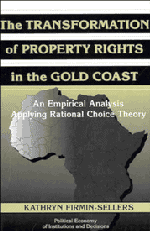 The Transformation of Property Rights in the Gold Coast
The Transformation of Property Rights in the Gold Coast Published online by Cambridge University Press: 08 January 2010
Under indirect rule, the British sought to govern the colonies by delegating authority to traditional rulers. The British relied upon these traditional authorities to maintain peace and prosperity in their states, implementing British policy and even advising officers during policy making. The strategy was unsuccessful, as the analysis in Parts I and II demonstrates.
Chiefs and non-chiefs manipulated the institutions of indirect rule to advance their own political and economic agendas. Yet, colonial institutions left both indigenous and European actors ill-equipped to deal with the ensuing conflict. Colonial institutions denied chiefs the coercive authority needed to enforce their decisions in the local arena; and colonial institutions failed to provide British officers with the information they needed to decide which claimant merited their support.
By the 1940s, colonial officials acknowledged their failure. Indirect rule had not promoted peace and prosperity. Instead, it had promoted widespread unrest and discontent as indigenous actors battled to claim the spoils of office or protested the chiefs' corrupt behavior. Only rarely did citizens succeed in making the chiefs accountable for their actions, as they had in Akyem Abuakwa.
Confronted with this failure, officials in London and Africa began to formulate an alternative system of governance for their colonial holdings. Their work was unhurried. By the end of World War II, officials had agreed to little more than the broad outlines for reform: Social and economic development must be prioritized over the maintenance of law and order; and the ‘educated African’ must be incorporated into the machinery of government.
To save this book to your Kindle, first ensure [email protected] is added to your Approved Personal Document E-mail List under your Personal Document Settings on the Manage Your Content and Devices page of your Amazon account. Then enter the ‘name’ part of your Kindle email address below. Find out more about saving to your Kindle.
Note you can select to save to either the @free.kindle.com or @kindle.com variations. ‘@free.kindle.com’ emails are free but can only be saved to your device when it is connected to wi-fi. ‘@kindle.com’ emails can be delivered even when you are not connected to wi-fi, but note that service fees apply.
Find out more about the Kindle Personal Document Service.
To save content items to your account, please confirm that you agree to abide by our usage policies. If this is the first time you use this feature, you will be asked to authorise Cambridge Core to connect with your account. Find out more about saving content to Dropbox.
To save content items to your account, please confirm that you agree to abide by our usage policies. If this is the first time you use this feature, you will be asked to authorise Cambridge Core to connect with your account. Find out more about saving content to Google Drive.